Premium Only Content
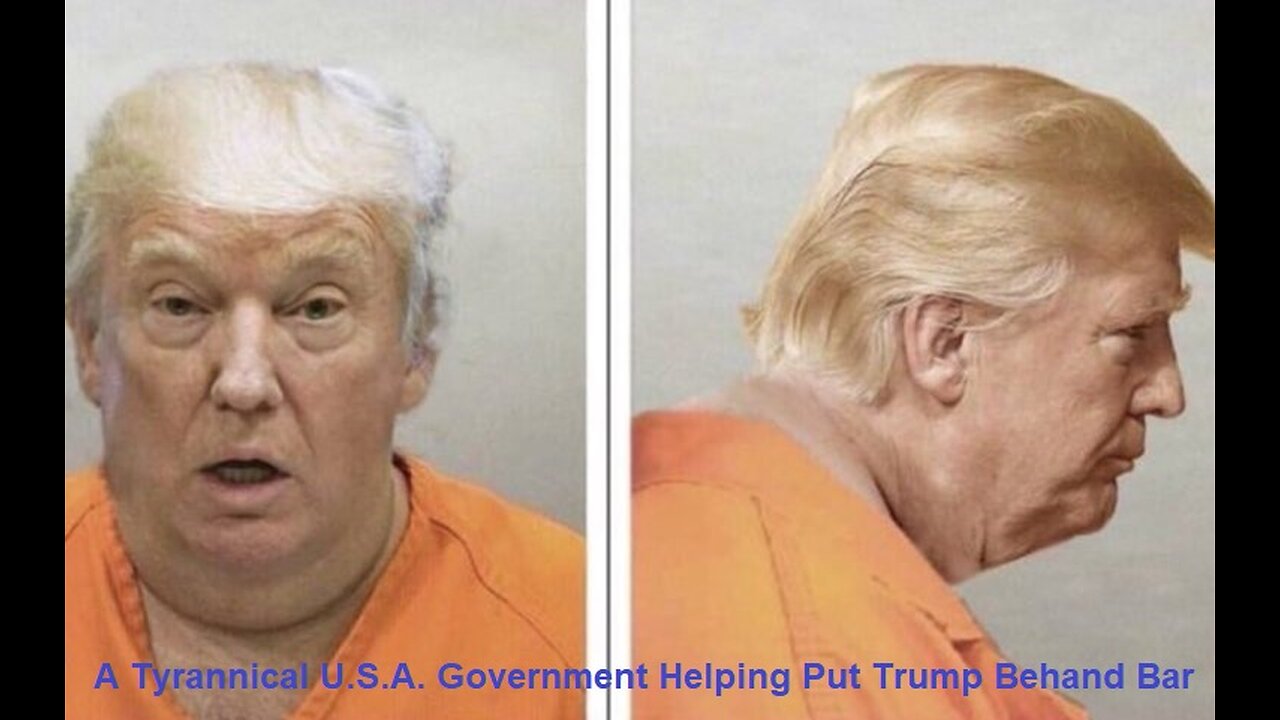
A Tyrannical U.S.A. Government Helping Put Trump Behand Bar & Said Jail For Life
NY DA Alvin Bragg grand jury fake investigation of Donald Trump's NY crimes. No Rule of Law, No Democracy demonstrates that when corrupt politicians are in power, they will protect their office and fail to implement rule of law reforms. Trump will pose for a mugshot, be fingerprinted and held in custody until a deal is negotiated if he surrenders in Stormy Daniels case: What next after ex-President was indicted on charges that carry up to four years in prison. Former president will face a typical booking - mug shot and fingerprints He may be allowed to skip wearing cuffs and is expected to do the perp walk in person. Donald Trump has been indicted over a $130,000 hush money payment to porn star Stormy Daniels. This dysfunction has been tested in one hundred cases over sixteen years with significant results, such as systematic corruption, misappropriation of state funds, an unreformed judiciary and arbitrary application of law due to the illicit character of transactions.
The former president will be treated like any other suspect - he will be read his Miranda rights, fingerprinted, and pose for a mug shot. He may even be handcuffed.
But Trump will likely be spared the indignity of a perp walk in which a suspect is led out of the police station or the Manhattan District Attorney's office in handcuffs in front of the cameras for the world to see. The rule of law is defined in the Encyclopedia Britannica as "the mechanism, process, institution, practice, or norm that supports the equality of all citizens before the law, secures a nonarbitrary form of government, and more generally prevents the arbitrary use of power." The term rule of law is closely related to constitutionalism as well as Rechtsstaat and refers to a political situation, not to any specific legal rule.
Instead, he will likely walk in, wearing a suit and tie, surrounded by aides and Secret Service agents. And he could even make a deal with prosecutors to come in via a back entrance, skipping the growing media frenzy. Local state and federal law enforcement are now braced for hordes of Trump loyalists and liberal protesters now expected to descend on the DA's office. Trump is charged for $130,000 in payments his former lawyer, Michael Cohen, sent to porn star Stormy Daniels toward the end of his 2016 campaign.
Prosecutors say the payment violated campaign finance laws, and was made to silence Daniels about an affair with the business titan.
Trump denied he ever had an affair. And, on March 18, the former president declared that he would be arrested on the 21st. He issued a rallying call for his supporters to protest the matter.
He will be the first president arrested since Ulysses S. Grant was pulled over for speeding in his horse and buggy at the corner of 13th and M streets in Washington, D.C - in 1872 - but police let him go with a fine. THE SURRENDER
The indictment will require Trump, who lives at his Mar-a-Lago estate in Palm Beach, Fla., to surrender to an NYC police precinct or the Manhattan District Attorney's Office.
He would have to fly to his former home state, likely on his campaign jet, which is known as Trump Force One.
Since a financial crime is considered a 'white-collar crime' and considered non-violent, Trump is expected to be allowed to self-surrender, skipping the perp walk.
In white-collar cases, the defendant's lawyers and the prosecutors typically agree on a date and time for the person to surrender rather than arrest the person at home.
The booking procedure typically takes four to six hours and includes being fingerprinted and photographed. The former president could be released on a Desk Appearance Ticket (DAT), meaning he has to appear at the courthouse later for the arraignment of charges. IF TRUMP DOESN'T SELF-SURRENDER
If Trump refuses to surrender voluntarily, prosecutors could seek to have him extradited from Florida.
Ironically, Florida Gov. Ron DeSantis, a Republican and former ally of Trump, would have to formally approve extradition.
Technically, it would be a strictly administrative move, carried out in his capacity as governor of the state.
Politically, it's an entirely different story. DeSantis has all but declared he'll run for president next year - making him a rival to Trump for the GOP nomination.
Even though DeSantis has few legal options other than to approve extradition, it will likely infuriate the conservative MAGA base he is trying to win over. If DeSantis didn't approve an extradition, New York would probably sue, setting up a long legal battle.
Some lawyers working for Trump have said the former president will surrender.
'There won't be a standoff at Mar-a-Lago with Secret Service and the Manhattan DA's office,' Trump attorney Joe Tacopina told the New York Daily News.
Following the indictment, prosecutors are now expected to contact his lawyers to negotiate his surrender, which could take several days. HANDCUFFS AND MUGSHOT
Trump would face a typical booking procedure like any other defendant. He would be told he has the right to remain silent and the right to an attorney.
He could be handcuffed and have his mugshot taken. Most defendants have their hands cuffed behind their backs, but some white-collar defendants - usually deemed non-violent - have their hands cuffed in front of them.
Or his lawyers could make a deal with prosecutors to allow the former president to escape the indignity of handcuffs and walk inside unencumbered. His Secret Service detail - which is legally bound to protect all former presidents - would be at his side.
In New York, mugshots are not typically released to the public, although they're occasionally leaked to the media.
THE ARRAIGNMENT
Trump would then appear for arraignment in Manhattan district court.
He would likely be released on his own recognizance and allowed to head home.
Given Trump's substantial ties to the community and his ongoing 2024 presidential campaign, the judge likely wouldn't deem him a flight risk and would probably immediately release him on bond, former federal prosecutor Renato Mariotti told Time magazine.
Trump held a campaign rally in Waco, Texas, on March 25th and was expected to keep his normal campaign schedule.
PREPARATIONS BEING MADE
The New York Police Department, New York State Court Officers, the Manhattan District Attorney's Office, the Secret Service, and the FBI have been braced for an arrest.
That includes preparing for possible protests.
Security barriers have already been set up around the Manhattan courthouse and the district attorney's office for more than a week.
Additionally, more than a dozen senior officials in the police department and two of Mayor Eric Adams' top public safety aides held a virtual meeting on March 19th to discuss security, staffing and contingency plans in the event of any protests, the New York Times reported.
The White House is also monitoring the situation.
'We're always monitoring the situation here, as best we can,' National Security Council Coordinator for Strategic Communications John Kirby said earlier this month.
'And we obviously don't want to see any activity go violent – certainly nothing to the extent that we saw on January 6,' he added. 'But we're watching this. We're watching it, of course, closely.'
Additionally, Manhattan district attorney Alvin Bragg could see his security detail expanded.
Bragg, a Democrat who is the first black person to lead the New York City office, has become a target of Trump's ire. The former president claims his investigation is politically motivated. THE TRIAL
Any trial would still be more than a year away, which would put it during the 2024 presidential election in which Trump is a candidate.
The average criminal case in New York takes more than a year to move from indictment to trial, said Karen Friedman Agnifilo, former Manhattan chief assistant district attorney, told Reuters.
Meanwhile, the specter of the trial would allow Trump to use it as a political issue, which he has made clear he will do.
The former president is expected to target Bragg and President Joe Biden, even though the Stormy Daniels case is a local New York case and not a federal matter.
Trump will also be watching to see what Republicans defend him, particularly his 2024 rivals.
A trial has other complications, such as a jury selection process.
Trump is obviously well-known, and a majority of people have an opinion about him - one way or another.
Both the prosecution and the defense will use the questioning process to try and ensure fair and impartial jurors.
The judge could also issue jurors a 'gag order' to keep them from talking to the media. The jurors also could be sequestered.
OTHER CHARGES
Former President Trump is also facing other investigations - two federal and one state probe in Georgia.
The Justice Department is investigating two separate matters: Trump's possession of hundreds of classified documents at Mar-a-Lago and his efforts to remain in power after losing the 2020 election, including his role in the January 6th insurrection at the Capitol.
Additionally, a special grand jury in Georgia has been convened to hear evidence of whether or not Trump and his allies tried to pressure officials to overturn Biden's 2020 victory in the state. The district attorney will decide whether or not to bring charges this spring. Former President Trump’s longtime personal lawyer Michael Cohen said on Sunday his former client will “absolutely” go through the formalities of being fingerprinted and photographed if he is arrested in connection to the Manhattan district attorney’s investigation into a hush money payment before the 2016 election.
“Do I think that Donald will be fingerprinted, swabbed, mugshotted? Absolutely,” Cohen said in an interview with Alex Witt on MSNBC. “Do I think he’ll be handcuffed? No. And in fact, I don’t want to see Donald Trump handcuffed and paraded through… because I respect the institution of the presidency.”
Cohen has become a sharp critic of Trump since he began cooperating with prosecutors in a Trump-related case that saw the attorney arrested in 2018 and sentenced to three years in prison. He testified for a second time before the Manhattan grand jury this past week.
His latest comments come after the former president said over the weekend that he expects to be arrested in the case on Tuesday, blasting Manhattan D.A. Alvin Bragg as corrupt. Trump called on his supporters to protest the possible arrest.
Anticipation is building for a possible indictment in the case, which centers around a hush money payment that Cohen admitted that he made to Stormy Daniels during the fall of Trump’s 2016 White House bid to keep her from coming forward about an alleged affair she had with the then-candidate. Trump has denied the affair.
Cohen was jailed for his involvement in the hush money payments to Daniels and others. His prison term, much of which was spent in home confinement, ended in 2021. He was also ordered to pay $1.4 million and forfeited another $500,000.
Despite the prison term and personal cost, Cohen insists his desire to see Trump held accountable is not due to a personal vendetta. This is about Donald Trump being held accountable for his own dirty deeds,” Cohen said. “I don’t want to see anyone, and that includes Donald Trump, indicted, prosecuted, convicted, incarcerated, because I fundamentally, or the country, fundamentally disagrees with so much of what comes out of his mouth.”
He said Trump being publicly handcuffed would be humiliating for the institution of the presidency and would not reflect well on the U.S. in the eyes of allies and adversaries.
“I don’t want to see Donal handcuffed and paraded through… because it’s an embarrassment to our country,” Cohen said. “Could you imagine our allies and our adversaries, how they could either enjoy this or despise us as a direct result?”
Donald Trump a ‘flight risk’ if criminal charges filed, experts say President Trump potentially faces a torrent of criminal charges when he leaves office, including charges linked to the deadly insurrection at the U.S. Capitol, making prosecutors worry that he is a flight risk.
Mr. Trump’s real estate empire extends to multiple luxury properties in countries that don’t have extradition treaties with the United States. And Mr. Trump himself publicly mused in October that he’d leave the country if he lost to Democrat Joseph R. Biden.
Douglas McNabb, a private attorney with expertise in international extradition defense, said that if criminal charges are brought, Mr. Trump fits the bill for becoming a fugitive from justice.
“He’s got money. He’s got property. He’s got access,” Mr. McNabb said. “The government would argue that he’s a flight risk.”
The White House did not respond to requests for comment.
If charged, Mr. Trump could flee to any number of properties he owns around the world. He owns a luxury hotel and tower in the United Arab Emirates and an unfinished hotel project in Azerbaijan, two countries that don’t have extradition treaties with the United States. But Mr. Trump may also be protected if he goes to his country club in Scotland or his resort in Ireland. Extradition is a notoriously difficult process even when countries have a solid agreement.
“He’s not going back to New York and he is not going to enjoy the comfort at Mar-a-Lago he would have in the pre-Capitol-ransacking world,” said retired Brig. Gen. Peter Zwack, a former Army intelligence officer. “I’ll bet the feasibility of fleeing has come up because, in my mind, it is the only way to avoid instant accountability and reckoning.”
While several world leaders have fled to other countries, usually in the wake of the coups or revolutions that overthrew them, no U.S. president has ever. What states have no cash bail? Before then, a number of states such as Kentucky, New Mexico, and New Jersey had reformed their cash bail system, however, California was the first to completely eliminate its cash bail system. Now, other states such as Illinois, Nebraska, Indiana, and New York have enacted bills to change their cash bail system.
How many states have no cash bail?
Abolition. As of March 2021, three states have abolished cash bail for the majority of court cases and one state has fully abolished cash bail starting January 2023. In 2014, New Jersey enacted reforms that took effect on January 1, 2017.
What states have removed cash bail?
The California Supreme Court has eliminated cash bail for defendants who can't afford it — writing that "conditioning freedom solely on whether an arrestee can afford bail is unconstitutional." ARI SHAPIRO, HOST: In California, the state Supreme Court has ruled to end cash bail if a defendant can't afford to pay. What states have bail reform?
Kentucky, Ohio and New Jersey aren't the only states reforming the bail system. Illinois, California, New York, Pennsylvania and others are making reforms. Some have taken drastic measures, completely reimagining the system, while others have started small and tried to build upward.
Where does bail money go USA?
When you originally pay bail, the court system, usually the sheriff assigned to your case, holds on to your money. If you show up when you're supposed to and you are exonerated of any charges, the money is returned to you within a couple weeks. Is there no bail in New York?
Although New York has yet to eliminate cash bail, the changes to the bail law give judges substantial discretion in fashioning pretrial release conditions to encourage people to come back to court.
What does Illinois no cash bail mean?
Proponents who pushed for the no cash bail law say that requiring people who have no financial resources to sit in jail until their trial concludes is cruel and unfair.
Can you go to jail for not paying bail bonds in California?
Can you go to jail for not paying bail bonds? The answer is yes. If you don't hold up your end of the bargain, the bond company can remand you back into custody.
In 1945, the United Nations was created on three pillars: international peace and security, human rights and development. Almost seventy-five years later, the complex political, social and economic transformation of modern society has brought us challenges and opportunities which require a collective response which must be guided by the rule of law, as it is the foundation of friendly and equitable relations between states and the base of fairs societies.
For the United Nations (UN) system, the rule of law is a principle of governance in which all persons, institutions and entities, public and private, including the State itself, are accountable to laws that are publicly promulgated, equally enforced and independently adjudicated, and which are consistent with international human rights norms and standards. It requires measures to ensure adherence to the principles of supremacy of the law, equality before the law, accountability to the law, fairness in the application of the law, separation of powers, participation in decision-making, legal certainty, avoidance of arbitrariness, and procedural and legal transparency.
The rule of law is fundamental to international peace and security and political stability; to achieve economic and social progress and development; and to protect people’s rights and fundamental freedoms. It is foundational to people’s access to public services, curbing corruption, restraining the abuse of power, and to establishing the social contract between people and the state. Rule of law and development are strongly interlinked, and strengthened rule of law-based society should be considered as an outcome of the 2030 Agenda and Sustainable Development Goals (SDGs).
In addition, particular, Goal 16 is an enabling goal for Member States to generate national-level policy changes that advance progress on other SDGs. The development of inclusive and accountable justice systems and rule of law reforms will provide quality services to people and build trust in the legitimacy of their government. This approach should respond to the needs of individuals and groups and their meaningfully participation from the outset, paying particular attention to those historically marginalized and at risk of being left behind. It includes prevention of serious violations of human rights, achieving credible accountability for those responsible at national and international levels and empowering individuals and communities to make use of justice mechanisms to protect their fundamental human rights.
The rule of law is an important component of sustaining peace, as advanced by the General Assembly and Security Council in the twin resolutions on the review of the peacebuilding architecture. Sustaining peace requires an integrated and comprehensive approach across the UN system, based on coherence between political, security, development, human rights, gender equality and rule of law activities in support of Member State-led efforts.
Strengthening the rule of law involves respect for the norms of international law, including on the use of force, and recognition of the primary responsibility of States to protect their populations from genocide, crimes against humanity, ethnic cleansing and war crimes. The rule of law is a core element of the humanitarian and human rights agendas; is crucial to understanding and addressing the reasons for displacement and statelessness; and is the foundation of the humanitarian protection regime.
Rule of law issues includes emerging and critical issues such as the proliferation of hate speech and incitement to violence; preventing radicalization/violent extremism; climate change and the environment impacting on the security and livelihoods of people; and the complexities of artificial intelligence and cybercrime.
-
 47:58
47:58
What If Everything You Were Taught Was A Lie?
8 days agoExposing Everyone And Everything A Epstein Survivor Interview Human Trafficking Child Sex Ring
3.26K5 -
 28:31
28:31
Anthony Rogers
13 hours agoBOWLING FOR SOUP interview
3.92K1 -
 17:12
17:12
Nate The Lawyer
2 days ago $1.65 earnedTrans Swimmer Lia Thomas Stripped of Titles for Being a Man in Women’s Sports
22.4K19 -
 12:17
12:17
Zoufry
18 hours agoThe Hunt For The Real Life James Bond
29.3K6 -
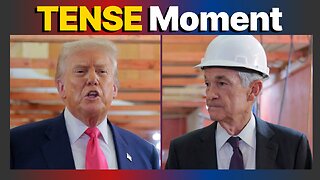 24:05
24:05
DeVory Darkins
8 hours ago $10.93 earnedTrump HUMILIATES Jerome Powell in TENSE moment... Columbia University surrenders
105K71 -
 14:17
14:17
Doc Rich
5 days agoLefties Losing It Once Again
31K35 -
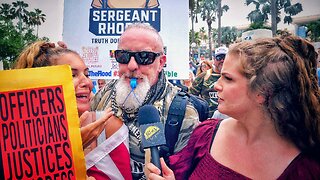 25:31
25:31
Liberty Hangout
1 day agoMAGA Crashes Pathetic Anti-ICE Rally
103K56 -
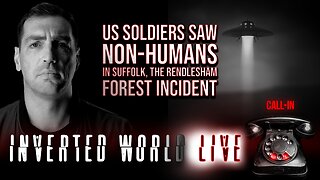 2:02:26
2:02:26
Inverted World Live
10 hours agoUS Soldiers Saw Non-Humans in Suffolk, The Rendlesham Forest Incident | Ep. 80
153K24 -
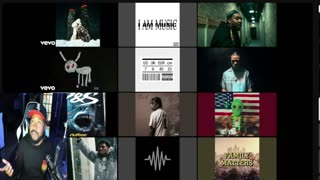 6:42:47
6:42:47
Akademiks
11 hours agoICE MAN EPISODE 2 tonight. NEW NBA YOUNGBOY 'MASA' TONIGHT. BIG AKADEMIKS #2 MEDIA PERSONALITY 2025.
98.3K5 -
 2:59:28
2:59:28
TimcastIRL
10 hours agoSouth Park Runs FULL FRONTAL Of Trump In Gross Parody After $1.5B Paramount Deal | Timcast IRL
279K212